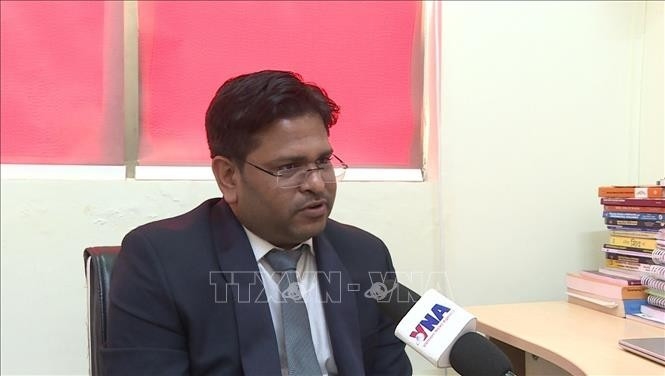In an interview with the Vietnam News Agency following the event, Dr. Manish Kumar Singh, lecturer at the Department of Computer Science, the University of Delhi, India, shared his views on Vietnam’s growing role and the global significance of the event.
    |
 |
|
Dr. Manish Kumar Singh, lecturer at the Department of Computer Science, the University of Delhi, India |
Singh described Vietnam’s selection as host of the signing ceremony as a historic milestone in the country's diplomatic process and technology development, saying it reflects the international community’s trust in Vietnam's growing role as a responsible partner in the global digital ecosystem.
According to him, the signing ceremony of the Hanoi Convention not only reinforces Vietnam’s image as a reliable player in multilateral relations but also demonstrates its strong commitment to joining hands in tackling one of the world’s most pressing non-traditional security challenges, namely cybercrime.
Vietnam is now well placed to serve as a bridge between developed and developing nations in building a safer and more inclusive cyberspace, he added.
He praised Vietnam’s professional organization of the event, which saw more than 70 countries sign the convention over two days.
This marks an important step in global cybersecurity cooperation, complementing previous frameworks, such as the Budapest Convention, which shares many similarities but lacks the voice from developing countries, he said.
For the Hanoi Convention to deliver long-term results, Singh identified three key factors, namely building cross-border trust, which ensures new legal frameworks still respect user data privacy; raising public awareness as individuals are the first line of defense against cyber threats, and cybersecurity education should be part of school curricula; and encouraging the involvement of the private sector and startups in addition to government agencies.
He also noted that new technologies such as artificial intelligence (AI), blockchain, and quantum computing pose both opportunities and challenges, adding that what matters is using technology responsibly and strengthening international cooperation in research and cyber governance.
According to Singh, the Hanoi Convention gives countries a rare opportunity to jointly work against cyber threats by creating shared legal definitions, common standards for digital evidence exchange, and mechanisms for cross-border cooperation.
For developing nations like Vietnam and India, it offers access to capacity-building resources, share technical expertise, and collective intelligence, he said. The cooperation will help narrow legal gaps, enhance mutual trust, and form the foundation for a safer and more cooperative digital ecosystem.
Regarding Vietnam - India cooperation in cybercrime prevention and control, Singh highlighted growing cybersecurity cooperation under the Vietnam - India Comprehensive Strategic Partnership, saying the two countries can further strengthen training in digital forensics, data protection, and cybercrime investigation. They can also coordinate in establishing regional cybersecurity norms through ASEAN and other multilateral forums, promoting a secure and resilient digital space in the Indo-Pacific.
He suggested that increased academic exchanges and public - private partnerships between Vietnam and India would improve their shared capacity to address emerging cyber threats.
Source: VNA